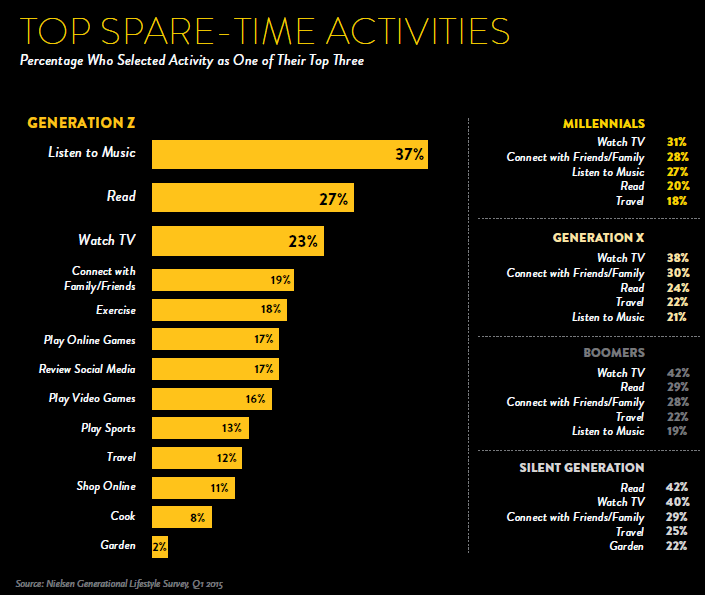Global Generational Lifestyles [REPORT]
November 18, 2015
A new global Nielsen study discovered that Millennials and Generation Z are surprisingly traditional when it comes to their aspirations, their entertainment pursuits and media consumption.
 The Nielsen Global Generational Lifestyles Survey polled 30,000 online respondents in 60 countries to better understand how global consumer sentiment differs across life stage. For the purposes of this study, respondents are segmented into five life-stage classifications:
The Nielsen Global Generational Lifestyles Survey polled 30,000 online respondents in 60 countries to better understand how global consumer sentiment differs across life stage. For the purposes of this study, respondents are segmented into five life-stage classifications:
- Generation Z (15 – 20)
- Millennials (21 – 34)
- Generation X (35 – 49)
- Baby Boomers (50 – 64)
- Silent Generation (65+).
The study examined how age influences how consumers around the world think, where and what they eat and how they save and spend. Today’s consumers are bucking yesterday’s preconceived generational notions. In fact, many older people are embracing a more technology-driven world, and sizeable numbers of younger people are turning to more traditional values. Yet for all of our differences, in many ways, it’s remarkable how similar we are no matter the age.
Old Myths, New Realities
- Traditional values, such as getting married, having children and buying a house are still relevant for many Generation Z and Millennial respondents. About one-in-five Generation Z and Millennial respondents consider buying a house (21% and 22%, respectively) or getting married (19% and 17%, respectively) one of their top three aspirations for the future. And 11% of Generation Z and 13% of Millennials picked having a baby as a top goal. More than one-quarter of Generation Z and Millennial respondents think the suburbs are the ideal place to live.
- When it comes to getting the news, TV and search engine sites have broad appeal for the young and old alike. Not surprisingly, older respondents prefer traditional sources like print and radio. The majority of those over age 35 turn to TV to get the news, but the medium still holds sway for nearly half of Millennial (48%) and Generation Z (45%) respondents as well.
- Millennials and Generation Z may have a reputation for being distracted by technology, but 52% of Baby Boomers admit that their mealtimes are not technology free. The Silent Generation (42%) is not far behind.
- Millennials and Generation Z appreciate dining out. Nearly six-in-10 Millennials (58%) say they eat out at least once a week, twice the percentage of Baby Boomers (29%). And 30% of Millennials eat out three or more times per week.
- Generation Z pick reading as one of their top spare-time activities. More than one-quarter of Generation Z respondents (27%) say reading is a top leisure activity, behind listening to music (37%).
- More than half across Millennials, Generation X and Baby Boomer generations are satisfied with their occupations, work environment, co-workers, work/life balance and boss—and sentiment mostly increases with age. However, less than half are satisfied with income and other medical, retirement and savings-plan benefits—and sentiment largely declines with age.
- Job loyalty may be a thing of the past. Millennials are roughly two times more likely to leave a job after two years, 1.5 times more likely after five years and half as likely to stay after 10 years, compared to Generation X and Baby Boomer respondents.
- Debt is a fact of life for more than four-in-10 respondents of all ages, including more than half of Generation X and Baby Boomer respondents. Older consumers carefully monitor spending and limit purchases, while younger respondents take a longer-term approach.
to download report, CLICK HERE.






























